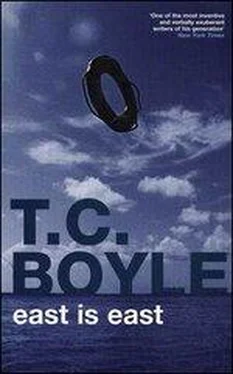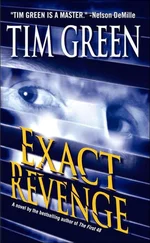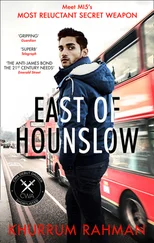Tom Boyle - East is East
Здесь есть возможность читать онлайн «Tom Boyle - East is East» весь текст электронной книги совершенно бесплатно (целиком полную версию без сокращений). В некоторых случаях можно слушать аудио, скачать через торрент в формате fb2 и присутствует краткое содержание. Жанр: Современная проза, на английском языке. Описание произведения, (предисловие) а так же отзывы посетителей доступны на портале библиотеки ЛибКат.
- Название:East is East
- Автор:
- Жанр:
- Год:неизвестен
- ISBN:нет данных
- Рейтинг книги:5 / 5. Голосов: 1
-
Избранное:Добавить в избранное
- Отзывы:
-
Ваша оценка:
- 100
- 1
- 2
- 3
- 4
- 5
East is East: краткое содержание, описание и аннотация
Предлагаем к чтению аннотацию, описание, краткое содержание или предисловие (зависит от того, что написал сам автор книги «East is East»). Если вы не нашли необходимую информацию о книге — напишите в комментариях, мы постараемся отыскать её.
, praised by
in
as "one of the most exciting young fiction writers in America," the result is a sexy, hilarious tragicomedy of thwarted expectations and mistaken identity, love, jealousy, and betrayal.
East is East — читать онлайн бесплатно полную книгу (весь текст) целиком
Ниже представлен текст книги, разбитый по страницам. Система сохранения места последней прочитанной страницы, позволяет с удобством читать онлайн бесплатно книгу «East is East», без необходимости каждый раз заново искать на чём Вы остановились. Поставьте закладку, и сможете в любой момент перейти на страницу, на которой закончили чтение.
Интервал:
Закладка:
Saxby hadn’t given it a thought—at this point the big awkward Japanese kid who’d lurched out of Peagler Sound that night and run from him at the market was more amusing to him than anything else. But now—just for a moment and so quickly that he dismissed it the moment the thought flashed into his head—an answer came to him: fried dace.
The next night—saturday—Ruth didn’t turn up for Cocktails, and Saxby sat with his mother on the veranda and watched for her. When Armand rang the dinner bell and still she hadn’t come in from the studio, he ambled into the main dining room and sat at one of the small tables in back with Septima and Owen. His mother rattled on about colony business—who was coming in the fall and how so-and-so had been turned down at Yaddo and how she wouldn’t dream of inviting her—and he closed his ears, shut down his brain and lifted the fork to his lips. After dinner he retired to the back parlor to brood over his aquarium. That morning he’d drained the tainted water, discarded the plants and gravel and rocks—he was going to give the thing a rest for a couple of days, and then he was going to start all over again. But he’d learned his lesson. This time he was going to Aquarium City and he was going to be patient. No more fooling around: he was going to breed albinos and he was going to make money. And what’s more, he was going to take his place among the great amateur aquarists of the century: William Voderwinkler, Daniel DiCoco and Paul Hahnel, father of the fancy guppy.
He tried the title out on himself— Saxby Lights, father of the albino pygmy sunfish —and then he put on a tape—Albinoni, one of his mother’s favorites—and settled into the easy chair with the latest National Geographic. He tried to read an article about the declining resilience of beards among Pacific Coast mussels and its implications for the future of the shellfish industry, but he couldn’t concentrate. He was restless. There was a reading that night—Bob Penick was previewing some new poems—but Saxby really didn’t have much use for poetry and would have gone only to please Ruth—and Ruth wasn’t back yet. A shadow fell over the house, and he reached to turn on the lamp: it was coming on to dusk.
And then suddenly he was out of the chair, his mind made up in an instant—damn it, he didn’t care what the rules were, he was going out there to surprise Ruth. She’d been working for twelve hours straight, for Christ’s sake—she could have written War and Peace backwards and forwards by now. Enough was enough. If he fractured her creative bubble, so much the worse, but she could reconstruct it tomorrow. He was tired of waiting.
Red dirt, green gone to gray: the path lay before him like a coil of smoke. He hurried along, sandflies giving way to mosquitoes, anoles rustling through the deepening clots of undergrowth. Up ahead, he heard the soft chuck and plaintive sobbing wills-widow of the night-flying bird whose call gives rise to its name, and the branches above him were filled with the roosting chatter of the day birds. It was the hour of evening when the diamondback extracts itself from a hole in the ground, drawn to the scurrying warmth of the quick-blooded mammals on which it preys. Saxby stepped lightly.
And then, as he was coming down the final stretch to the cottage, a shadow settled into the path before him. Thick, furtive, dark with the shades of night. It was probably just a cornsnake, but he and Ruth would be coming back up this path in a few minutes, and he didn’t want any surprises. Ten feet from the thing—it was a snake, all right, coiling itself like a lariat, dead center in the middle of the path—Saxby bent for a stick. Crouching, one foot extended and the stick outstretched like a foil, he inched toward the thing and felt his heart freeze within him when it struck at the stick and thrashed its rattles all in the same instant. The chirring was explosive, grating, loud as castanets. But it subsided almost immediately, and the shadow of the snake melted into the undergrowth with the faintest crepitation of leaf and twig.
Saxby dropped the stick and moved on up the path, blood pounding in his ears. Always fun playing with snakes, he thought, setting one foot down after the other with the exaggerated care of a man wading through wet cement. Night was settling in as he came round the final loop in the path, and he cursed himself for having forgotten his flashlight. But Ruth would have one—and if she didn’t, they’d cut a stick and sweep the path before them, as he used to do when he was a boy coming home late from some adventure on the other end of the marsh. He was thinking of Ruth, a comical version of the snake encounter already taking shape in his mind, when the cottage came into view.
There was no light.
That was a surprise. At first he thought he’d missed her somehow, but then he remembered his last postprandial stroll out to the cabin and how he’d found her sitting there in the dark. He was going to call out, but something made him stop. She was talking to someone, her voice a murmur, indistinct, a current of admonition or urgency to it, as if she were scolding a child. And then the screen door wheezed open, slapped shut. Saxby froze. There was someone on the porch, and it wasn’t Ruth.
The Dogs are Barking, Woof-Woof
When ruth came to him out of the night, he was dreaming of his mother, his haha, his okāsan, the soft-smiling girl in the miniskirt who’d brought him into the world and suckled him and looked deep into his eyes. It was a dream of the cradle, an oneiric memory, idealized and distilled from the stack of photographs his grandmother kept in the bottom drawer of her dresser. The photos flapped through his dream like a riffled deck of cards and he saw his mother standing outside a cram school with her guitar and the strong heavy legs and handsome wide face he’d inherited from her; saw her on the futon, thinner now, eyes fixed on the kicking infant framed by the crook of her arm; saw her alone in a crowded bar, bottles winking like stars behind her. And then her face pulled back and rose like the moon into the sky above him and she was Chieko, the wide-hipped girl he’d met in a dive in the Yoshiwara District, her arms around him, lips tugging at his own like sentient things. …
Then the door rattled and he knew the police had come for him with their Negroes and their dogs.
But no: it was Ruth’s voice coming to him out of the shadows. Ruth’s voice. Fumbling for his shorts, the latch, was something wrong? No. Did she want him to turn on the light? No. She was wearing some sort of musk, a scent that came from a bottle and brought him back to his dream, to Chieko and the scintillating lights of the Yoshiwara.
Ruth kissed him, her lips cool on his own, and he felt her tongue in his mouth. Her dress was chiffon, electric against his skin. He didn’t understand—they were friends, she’d told him, only friends, and the big butter-stinker with the hair like rice paper and the leaping pale eyes, he was her lover. But her dress fell to the floor as if tugged down by invisible hands and she held him, her flesh pressed to his, the pure white long-legged puzzle of her involved in him now, and he didn’t try to understand, didn’t want to, didn’t care.
In the morning, in the fullness of the light, she raised her head from his chest and looked into his eyes. He felt her there, poised against him, and he listened to the soft murmur of life awakening in the trees and held on to that cool gray gaze with a prick of emotion that must have showed in every line of his face. She seemed to be deciding something, sizing him up, reviewing the night and the moment and the sudden flurry of her options. “Only friends,” he murmured, and it was the right thing to say. She smiled, opening up, blossoming, and then she kissed him and everything fell into place.
Читать дальшеИнтервал:
Закладка:
Похожие книги на «East is East»
Представляем Вашему вниманию похожие книги на «East is East» списком для выбора. Мы отобрали схожую по названию и смыслу литературу в надежде предоставить читателям больше вариантов отыскать новые, интересные, ещё непрочитанные произведения.
Обсуждение, отзывы о книге «East is East» и просто собственные мнения читателей. Оставьте ваши комментарии, напишите, что Вы думаете о произведении, его смысле или главных героях. Укажите что конкретно понравилось, а что нет, и почему Вы так считаете.











